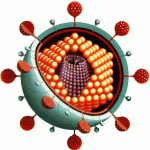Virology
|
22 october 2014 02:37:11 |
| An outbreak of acute norovirus gastroenteritis in a boarding school in Shanghai: a retrospective cohort study (Epidemiologic Perspectives & Innovations) |
|
Tweet Background:
More than 200 students and teachers at a boarding school in Shanghai developed acute gastroenteritis in December, 2012. The transmission mode remained largely unknown. An immediate epidemiological investigation was conducted to identify it.
Methods:
Using a retrospective cohort design, we investigated demographic characteristics, school environment, and previous contacts with people who had diarrhea and/or vomiting, drinking water conditions, recalls of food consumption in the school cafeteria, hand-washing habits and eating habits. Rectal swabs of the new cases and food handlers as well as water and food samples were collected to test potential bacteria and viruses. Norovirus was detected by real-time reverse transcription-polymerase chain reaction (RT-PCR).
Results:
A total of 278 cases developed gastrointestinal symptoms in this outbreak, and the overall attack rate was 13.9%. The main symptoms included vomiting (50.0%), abdominal cramps (40.3%), nausea (27.0%), diarrhea (6.8%) and fever (6.8%). Twenty rectal swab samples were detected as Norovirus-positive, including 11 from student cases and 9 from asymptomatic food handlers (non-cases). Among environmental surface samples from the kitchen, 8 samples were also detected as Norovirus-positive. The genotypes of viral strains were the same (GII) in patients, asymptomatic food handlers and environmental surfaces. Other samples, including rectal swabs, water samples and food samples were negative for any bacteria and other tested viruses. Asymptomatic food handlers may have contaminated the cooked food during the food preparation.
Conclusion:
The study detected that the outbreak was caused by Norovirus and should be controlled by thorough disinfection and excluding asymptomatic food handlers from food preparation. Early identification of the predominant mode of transmission in this outbreak was necessary to prevent new cases. Furthermore, good hygiene practices such as regular hand washing and efficient daily disinfection should be promoted to prevent such infection and outbreaks. |
| 107 viewsCategory: Pathology, Virology |
 Process evaluation of a multicomponent dyadic intervention study with exercise and support for people with dementia and their family caregivers (Epidemiologic Perspectives & Innovations) Process evaluation of a multicomponent dyadic intervention study with exercise and support for people with dementia and their family caregivers (Epidemiologic Perspectives & Innovations)A birth cohort study to investigate the association between prenatal phthalate and bisphenol A exposures and fetal markers of metabolic dysfunction (Epidemiologic Perspectives & Innovations) 
|
| blog comments powered by Disqus |
MyJournals.org
The latest issues of all your favorite science journals on one page
The latest issues of all your favorite science journals on one page



